President’s letter
Dear friend,
Thank you for trusting us to make a difference here in Illinois. Without your help, none of what you will read in the pages ahead would be possible.
The power of this think tank comes from taking the right ideas, at the right time, delivering them to the right audience to compel action. This makes the Illinois Policy Institute unique.
In America we have seen it’s not sufficient to have the facts on your side. What is necessary is to weaponize these facts to compel action.
The Illinois Policy Institute has built the most effective think tank in Illinois, and now we’ve deployed the battle tank.
Your investment in the institute has helped build the infrastructure to win in Illinois. Here’s how.
Growth in audience
We have invested in building our audience to expand our impact. We do this by taking low-friction issues, such as a gas tax increase, and asking people to sign a petition. We then fold them into our audience and send them our daily content.
This year we began The Morning Briefing, an email newsletter that goes out weekdays featuring institute content and the top articles of the day.
This product is being opened over 1.5 million times, every week.
To put this into perspective, this is more opens than the Chicago Tribune, the Chicago Sun-Times, Crain’s Chicago Business, and WBEZ — combined.
Up to 60% of all recipients open this email (the industry average is 21%). This means our message is hitting its target. People are craving news they can trust.
In the year ahead, your investment in sharing the truth will be consumed over 100 million times.
The impact of the Local 1 documentary
In February of 2023, we asked Illinois residents: What is your opinion on the Chicago Teachers Union? It turns out the CTU had a net 17% favorable opinions minus percentage unfavorable.
We then released our Chicago Teachers Union documentary, entitled “Local 1: The Rise of America’s Most Powerful Teachers Union.”
In the weeks following its release, the documentary was watched by over 1 million people in Illinois. Local book clubs started hosting “watch parties.” Teachers sent links to their friends and fellow teachers.
For the first time, audiences saw a teachers union that has abandoned their goal of educating students – where only 26% of Chicago elementary students can read at grade level. They saw a radical organization where only 17% of union dues go to representing teachers.
Instead, they have become a corrupt operation whose goal is to expand political power.
In the months following the viral documentary, the teachers union’s favorables have fallen from +17% to -9%.
With teachers unions leading the effort to strip nearly 10,000 scholarships from impoverished kids, to their relentless effort to end the most academically successful schools in our state, to the stories of corruption and hypocrisy as teachers union leaders send their kids to private schools – the teachers unions will continue to bury themselves in controversy. But this will create opportunities for free-market ideas to become law and for us to restore choice in education. We plan to exploit these opportunities to the fullest.
The Center for Poverty Solutions
This year, we launched the Center for Poverty Solutions to help the poor and disadvantaged move from welfare to work with dignity.
In America today, we are approaching the same number of able-bodied adult men without work as during the Great Depression. The result is devastation in mass quantities.
There is a rise in America in what is being called “deaths of despair.” This is an increase in drug overdose, alcohol abuse and suicide.
It’s predominantly happening to adult men, on government assistance, without jobs.
The Center for Poverty Solutions will change that.
We are working with direct service providers to create opportunities for work. Even more, we are asking them to join our coalition so we can go to our government and demand they remove barriers that prevent people from working.
The results manifest themselves in the lives of people such as Steven Blake. Steven was homeless for years, but he started selling fresh fruit to commuters. Today, Steven has a roof over his head and food to eat. But more importantly, Steven understands the solution to poverty is not a handout: it is the dignity of work.
Local government outreach
The institute is embarking on a critical journey through which we educate Illinoisans on what is happening in our state and the policies impacting them locally.
Working in your communities, learning about your backgrounds, we seek to reform policies from the ground up. We want to help our local governments with toolkits, model policies and the reinforcements to make commonsense reform a reality. Our focus remains to change the policies in Springfield, but we also seek to work with leaders at the local level in cities such as Aurora, Joliet and Naperville to make impactful change, now.
As we move into 2024, we continue to fight alongside Steven and tens of thousands of men and women who want to find that same dignity he did through work. We will continue to stand up for poor kids so they have the same educational opportunities as everyone else. We are going to peel back the layers of local government to use our reach at a local level for the most direct impact.
The best part, we will compel them to take action and change the laws in our state.
The right message, at the right time, to the right audience to compel action.
It has the power to change the world. It is made possible because of you.
Thank you,
Matt Paprocki
Innovation grows institute’s impact in 2023
The Illinois Policy Institute has built the most powerful public policy megaphone in the state, and in 2023 grew its audience to exceptional new levels.
Not only did the institute educate millions of Illinoisans about our state’s challenges, but it activated them to advance commonsense, free-market reforms. Here’s how that happened.
The Morning Briefing
We launched our daily newsletter, the Morning Briefing, just after New Year’s Day in 2023 as a formidable entry into the newsletter space. Featuring institute content and curated news stories important to taxpayers, we saw steady growth through the year – meaning we grew our audience’s trust and reliance.
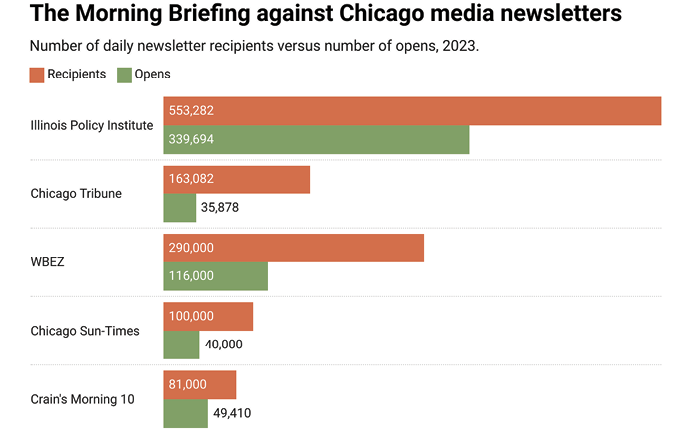
Those who opened their The Morning Briefing emails grew from 375,411 people per week in January to 1,512,565 by the final week of 2023 – a quadrupling of the audience. We also grew our rate of people opening the email to over 60% a day, triple the industry average.
Total opens in 2023: 39,137,520
Each day, nearly one-third more people open The Morning Briefing than open the four biggest competitors – combined.
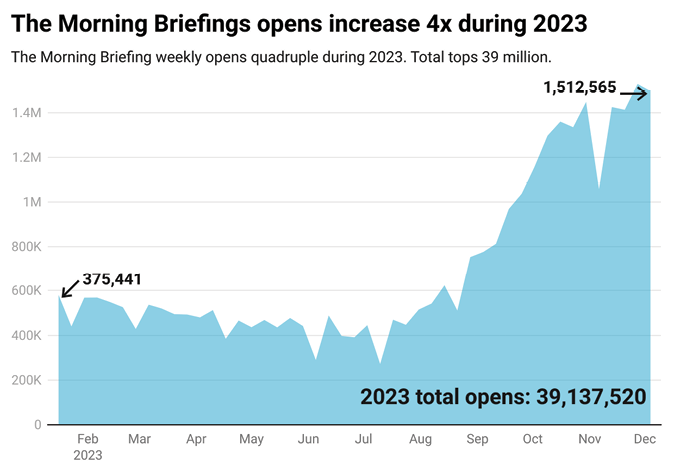
The Weekly Briefing
A weekly spin-off of The Morning Briefing exclusively showcases Illinois Policy Institute content to audience members whose involvement shows potential for growth. The Weekly Briefing added more eyeballs on our content in 2023.
Total opens in 2023: 4,296,070
Short videos
We entered the short-form video content space in 2023: an effort to reach a younger, more diverse audience that will decide the future of Illinois.
In 2023, we had 6,846,986 views on Instagram, 2,064,082 on TikTok and 2,997,369 on YouTube. Nearly all were short-form videos.
Total views in 2023: 12,161,771
Additionally, illinoispolicy.org drew over 5.8 million views on our written content in 2023. Institute social media channels similarly recorded growth in how many people wanted to know when we had content to share.
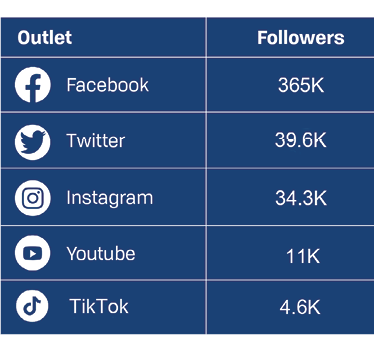
Within legacy media, the number of institute op-eds that have been published in major newspapers continued to grow. In 2023 there were a record-setting 62 op-eds published in targeted newspapers alone. This beat out our top competitors, securing our voice as the loudest and biggest leader in public policy.
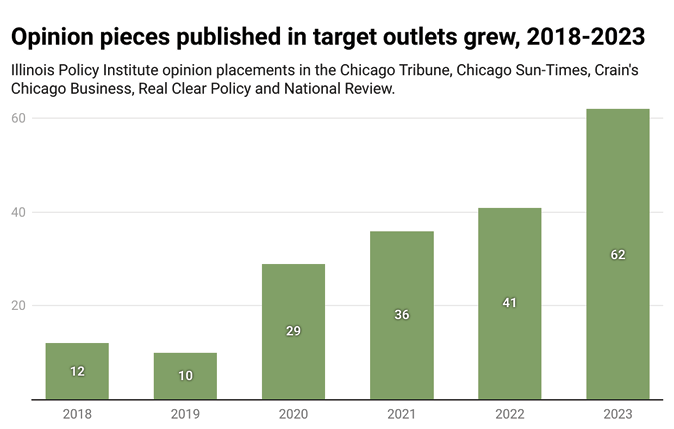
Your investment has helped us grow into an influential free-market think tank that is making life better for Illinoisans. Tally it up, and our messages reached people well over 61 million times last year – about five per Illinoisan. With your continued support, we will further expand our reach and lead Illinois’ comeback.
Giving Illinoisans more reasons to stay in 2024
Illinois ended 2023 with more discouraging news about the nearly 84,000 people who left the Land of Lincoln for other states. Now, as we look ahead, we are more determined than ever to make headlines about outbound moving vans a thing of the past. We intend to do that by championing policies that encourage job creation, expanding opportunity for all Illinoisans and by identifying the causes of our state’s dysfunction and fighting to reverse them.
Here are some key areas of focus for 2024.
Reaching out to aligned Hispanic Illinoisans
Hispanic Illinoisans are one of the fastest-growing demographic groups in the state, increasing 9.4% between 2010 and 2020. By contrast, the population of white Illinoisans declined by 5.3% and Black Illinoisans by 1.7% during that time. National survey data shows significant numbers of Latinos are conservative in their policy preferences, which means a new opportunity to change our state for the better.
This year, we will engage on a broader and deeper level with free-market-oriented Hispanic Illinoisans. We will use recent polling information to offer more content that addresses our Hispanic audience members’ greatest concerns and will meet with Latino leaders of business, community and grassroots groups to foster relationships and learn more about their interests.
Our goal is to move at least half of the Hispanic Illinoisans in our audience to become active members of our free-market community – contacting lawmakers about important legislation, attending events and voting. Engaging with Hispanic Illinoisans will enable us to increase the ranks of active conservatives who demand their leaders pass laws that limit government and expand freedom and opportunity for residents.
Passing legislation at the local level
While the Illinois General Assembly and Governor’s Mansion are dominated by Democratic politicians who oppose free-market policies, the second, third and fourth largest Illinois municipalities – Aurora, Joliet and Naperville, home to nearly 500,000 people – have conservative leadership. This year, our advocacy arm, Illinois Policy will work with free-market-friendly local governments to achieve legislative victories that will make their municipalities easier places to do business and live. From there, we can expand effective free-market policies to other conservative-leaning locales throughout the state.
Exposing the Chicago Teachers Union
The Chicago Teachers Union is a roadblock for good legislation and a cheerleader for bad bills that harm Illinoisans. In 2023 the Illinois Policy Institute exposed the hypocrisy of CTU leaders’ efforts to quash school choice for low-income families. And we revealed how much money CTU gives to politicians, including Chicago Mayor Brandon Johnson – buying influence and imposing the union agenda on Chicago and Springfield.
Our efforts resulted in CTU’s net favorable opinion numbers dropping to -9% from +17% among Chicago voters.
We will continue to expose CTU’s radical agenda and its outsized influence on Chicago City Hall and the Statehouse in 2024 so voters and concerned residents can hold the union and elected leaders accountable.
Changing the way we address poverty in Chicago
In 2023 we launched our Center for Poverty Solutions to bring free-market policies to bear on the way we address poverty in Chicago. Through the leadership of our Executive Director Dr. Eddie Kornegay, we will partner with direct service providers in 2024 to advocate for legislation and policies that encourage work and bring dignity to people struggling with poverty.
Fighting the ‘mansion tax’
In March 2024, a hike on real estate transfer taxes will be on the ballot in Chicago. The institute will continue to beat the drum on the threat the tax increase poses to Chicago’s already struggling commercial real estate market and the anti-business, anti-growth impact the added tax would have on Chicago. A ballot committee supported by our 501(c)(4) advocacy arm, Illinois
Policy, will move our audience to get to the polls by exposing the harm this tax hike would inflict.
Recruiting candidates for more competitive elections
In 2022 Illinois Policy set out to fight the apathy that comes from having only one choice at the ballot box. On average, fewer than 58 of the 118 Illinois House seats were contested from 2012-2020 – meaning more than half of the Illinois House members had run unopposed.
As a result of our candidate recruitment efforts, 2022 was the most contested non-presidential election in the past two decades, with 3.8 million Illinoisans voting in 79 competitive Illinois House of Representatives elections. These competitive House races provided real choice for 900,000 Illinois voters who otherwise would have had only one option on their ballots.
For the 2024 election cycle, Illinois Policy has recruited, vetted and helped secure ballot access for 21 free-market-aligned candidates for the Illinois House and four for the Illinois Senate. We are continuing to recruit and vet candidates for the slating period that runs from March to June. Not only are we recruiting aligned candidates, but we are also providing candidate training with our fiscal, education, economic and good government policy solutions. Our goal is to have contested elections for 30 districts in the General Assembly and record free-market voter turnout in November.
We are excited to seize every opportunity in 2024 to lay the groundwork for making inbound moving vans the headlines in the years ahead.
Looking back
Illinois Policy Institute launches Center for Poverty Solutions in 2023
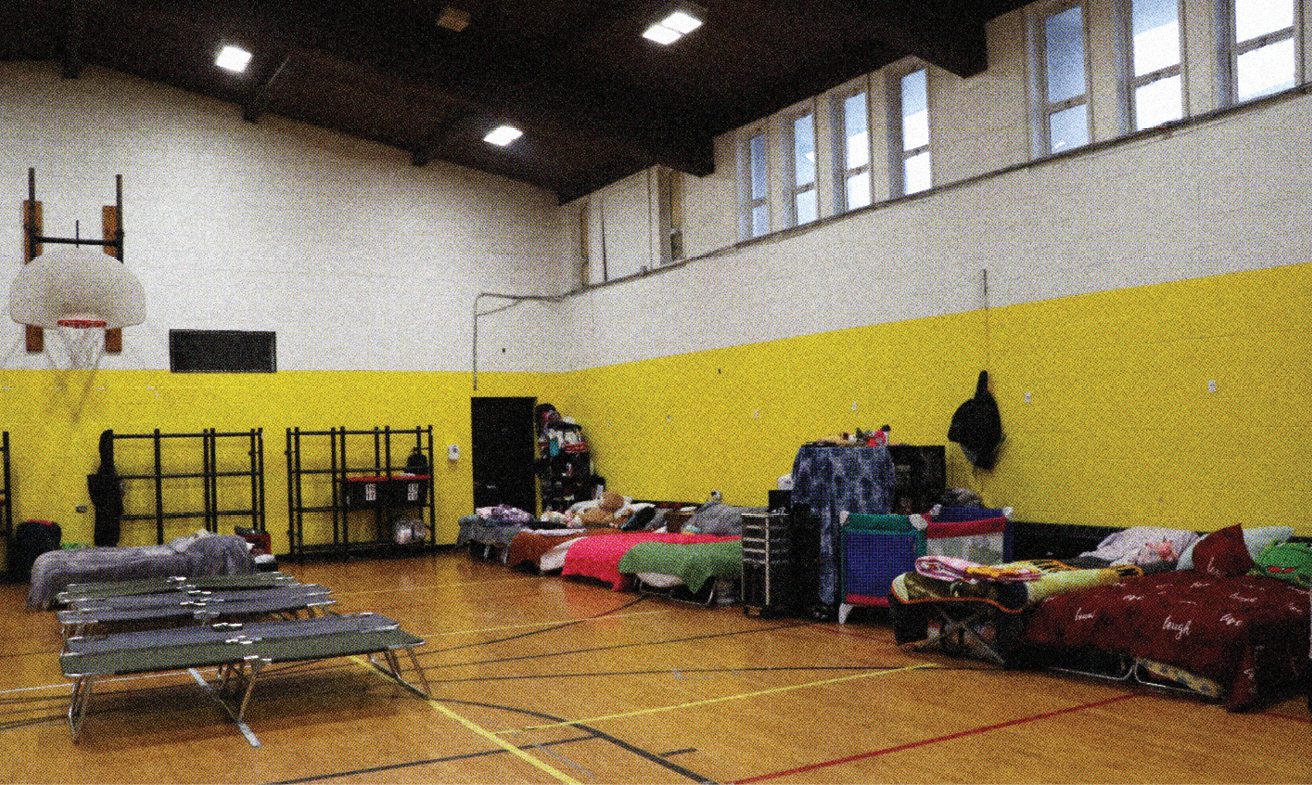
The Illinois Policy Institute is dedicated to empowering all citizens of Illinois to reach their full potential and thrive, especially those working to escape poverty. That’s why we launched the Center for Poverty Solutions in 2023 and went to work on defining the problem and seeking solutions.
Poverty has persisted for generations despite over $12 trillion in government spending spread across decades intended to alleviate it. The Illinois Policy Institute established the Center for Poverty Solutions to provide innovative, free-market approaches to the problem.
The center builds upon the institute’s strong history of successfully advocating for policy changes. The center works with direct-service organizations to identify effective anti-poverty solutions, help providers scale those solutions and move people from assistance to self-reliance. The truest value of this work is in restoring human dignity and purpose that government dependence has robbed from our disadvantaged neighbors.
There are about 450,000 Chicagoans living in poverty. The goal of the center is to reduce that number by 5% by 2033.
The most important milestones for the center during 2023 included the appointment of Dr. Eddie Kornegay as the founding executive director of the center, our first steps to partner with direct-service organizations and producing reports outlining the poverty problem and solutions.
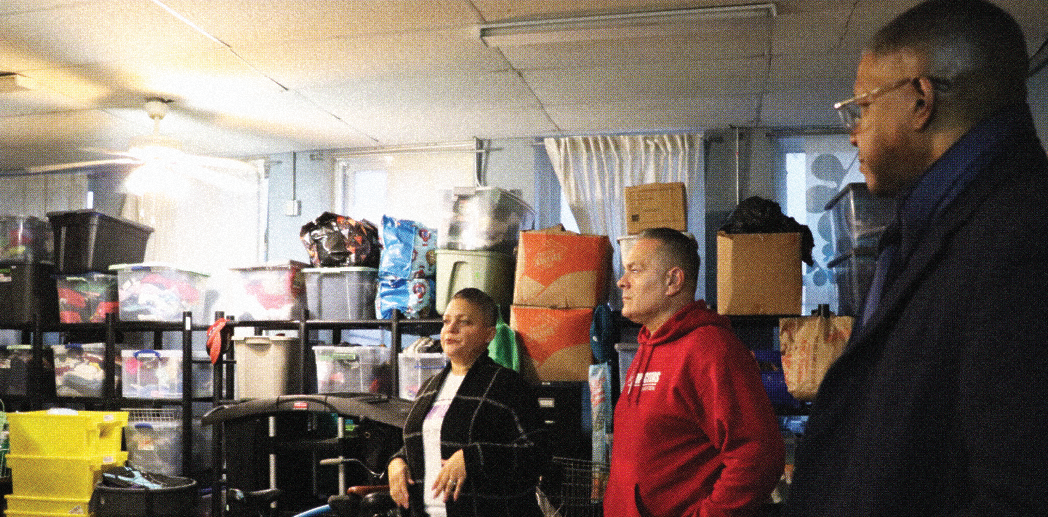
In the most recent report, “Common-ground solutions to empower Chicago’s poor: A model for America’s cities,” we identify seven free-market solutions with consensus between conservatives and progressives on how to empower individuals to rise out of poverty. The solutions are:
- Empower people through the dignity of work.
- Prepare individuals for the future of work.
- Remove barriers to work.
- Reform our educational system.
- Restructure safety net programs.
- Promote affordable housing.
- Promote family formation and stability.
The report will guide the institute’s poverty policy agenda for the coming years, which will focus on areas we think are most ripe for policy reforms. We will conduct rigorous research in each area and provide actionable, scalable solutions to address poverty in Chicago and beyond.
The first policy area on which we will focus is affordable housing. We will begin by establishing the number of Chicagoans, especially poor Chicagoans, who are inordinately burdened by housing expense, defined as spending more than 30% of one’s income on housing. We will investigate the scale and impact of Chicago’s zoning restrictions on this metric.
Our research will be distilled into a report outlining policy changes Chicago could choose to make housing more affordable, especially for the poor and disadvantaged. The ultimate measure of success will be whether the percentage of Chicagoans who are cost-burdened by housing expense decreases over time.
Kornegay will work to leverage our findings in partnership with direct-service organizations to develop programs, exchange ideas about the best ways to empower people to overcome poverty and advocate for the best policy solutions. The center’s initial focus is on those Chicago neighborhoods where poverty is most severe: Humboldt Park, Roseland, Englewood, Austin, East Garfield, West Garfield, Lawndale and North Lawndale.
Since the founding of the Center for Poverty Solutions, we have held 41 meetings with potential partners, with more meetings planned throughout 2024. These conversations are already starting to yield results. As of January 2024, we had formed seven partnerships with direct-service providers, and we will be pursuing more.
We are currently working with organizations dedicated to advancing education and workforce development, removing barriers to work, securing affordable housing and facilitating workforce reentry. Our partners include i.c.stars, the HOPE Center Foundation, the Illinois Coalition to End Perpetual Punishments, the Decarceration Fellowship, Life Impacters Foundation, Chicago City Life Center, the Eden Career Institute and Project H.O.O.D./New Beginnings Church.
One of our guiding practices is to listen to those who are closest to the problem, who are on the ground working with the people we
ultimately seek to help. Our plan is to provide these direct-service providers with technical support, leadership resources, civic engagement strategies and policy formation assistance to further our common mission.
While we are dedicated to advocating free-market ideas as a basis for policy, we also recognize the need to test these policies as they are implemented to see what works and what does not.
The Center for Poverty Solutions is working with partners to establish an institutional framework within which we can pursue our mission on a consistent, ongoing basis and in a manner that enables us to track the real-world impact of our solutions. Our proposed advisory cohorts are key to accomplishing this. Kornegay is working to establish these cohorts with our aligned service providers.
Each cohort would consist of a group of 12 service providers, each committing to a 12-month engagement. The center’s plan is to launch a new cohort each year. The experience of these cohorts will inform policy development and assist us in assessing what are the best approaches for poverty alleviation.
Other plans include regular provider engagement meetings, special topics webinars, and special events to highlight partnerships. The importance of the center’s work is attested to by Chicago’s poverty crisis, one of the worst in the nation.
17.2% of Chicagoans live below the federal poverty line, up from 12% before the nation launched its War on Poverty in 1965. The Illinois Policy Institute’s Center for Poverty Solutions is dedicated to providing a pathway to prosperity for those who need it most.
Introducing Dr. Kornegay, Executive Director of the Center for Poverty Solutions

Eddie Kornegay, Ph.D., is the executive director of the Center for Poverty Solutions at the Illinois Policy Institute. He oversees and directs the formation of partnerships with direct service organizations to exchange ideas about the best ways to empower people to overcome poverty. He also works with groups to advocate for the policy solutions that will alleviate poverty. Dr. Kornegay brings to the center over 28 years of experience in urban ministry and community organizing.
Prior to his work at the institute, Dr. Kornegay served as the dean of continuing education and professional development at the Joseph Business School and as the director of R.I.S.E., an innovative pre- and post-release reentry program that provides practical skills training and mentoring at the Cook County Jail and Illinois Department of Corrections facilities, as well as running expungement clinics nationwide. He also taught and mentored weekly inside the supermax and maximum security divisions at the Cook County Jail.
Dr. Kornegay earned his bachelor’s degree in English from North Carolina Agricultural and Technical University, his master of divinity degree from McCormick Theological Seminary, master of sacred theology degree from Chicago Theological Seminary, and his Ph.D. in theology, ethics, culture and human science from Chicago Theological Seminary. He is also certified in full stack software development.
Dr. Kornegay proudly served in the United States Marine Corps.
He is married with four children and lives in Forest Park, Illinois.
Illinois’ setback for school choice offers opportunities
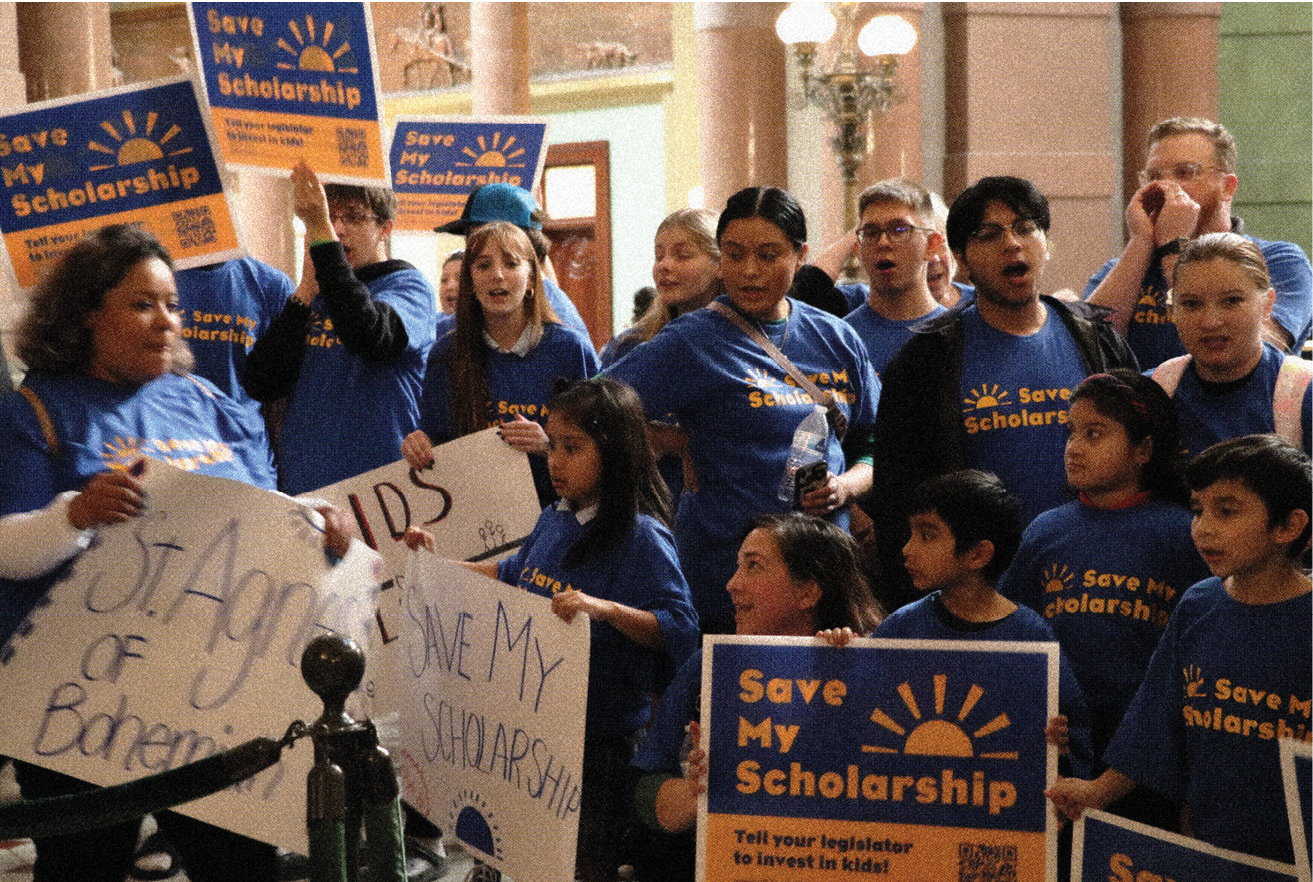
It’s fair to say Illinoisans love school choice, so it’s frustrating to see the state roll back education options in a year when 18 other states advanced them.
In the last statewide survey the Illinois Policy Institute sponsored in 2023, about 64% of voters were in favor of school choice. The state’s private school choice program, Invest in Kids, specifically had 58% support.
But state lawmakers listened to the teachers unions’ threats and cash rather than the voters. Invest in Kids was chopped.
Still, the institute gained valuable insight and partners through the effort. It intends to amplify the voice of the majority and expand school choice in Illinois.
Illinois Policy’s campaign for private school scholarships for low-income students brought us side by side with families and educators. Months were spent telling personal stories about how the scholarships had changed young lives.
“I know that there are other schools, but Leo is the best school for me,” said Ian Holmes-White, a freshman at Leo High School in Chicago thanks to an Invest in Kids scholarship. “It’s a place where I can be myself and not be judged. For the first time in my life, I feel like I enjoy school.”
Data was shared showing how effective the program was at letting children escape failing urban schools or finding a better fit for their needs. Investigations hammered at teachers union bosses and the hypocrisy of fighting school choice for disadvantaged students while sending their own children to private schools.
In November, Illinois Policy staff joined a group from schools across the South and West sides of Chicago for a demonstration outside Gov. J.B. Pritzker’s office. Teachers and students whose lives were changed by the scholarships spoke to the press from the sidewalk.
When the speakers concluded, three students approached the doors to deliver a poster signed by the petitioners asking Pritzker to save their scholarships. The moment was prophetic: security guards locked the students out of the public building. The poster was left leaning outside the door, the closest students came to being heard by the governor.
Later in the month, when state lawmakers had a last chance to save the program before it expired, Illinois Policy staff and education allies again joined families and educators in Springfield. At a press conference Nov. 8, those families had a chance to spread their message across the state. One mother shared how the program helped her son escape bullying and a classroom environment that wasn’t working for him. The scholarship helped him go from failing to As and Bs.
Lawmakers for hours in their final session heard children, parents and educators chant outside the closed chamber doors. Hundreds of blue “Save My Scholarship” shirts and signs crowded the balconies.
One of the groups attending was from St. Frances of Rome School in Cicero. Their students carried signs reading, “I love my school,” and, “I want to graduate from SFR.”
That won’t happen. The Archdiocese of Chicago announced St. Francis of Rome and another parochial school would close at the end of the school year because so many of their students relied on the Invest in Kids scholarships. State lawmakers let the program die and killed two Chicago-area parochial schools and two more in Southwestern Illinois as a result.
Still, those poll results show this is a battle Illinoisans want. Illinois Policy is dedicated to advancing school choice here. In 2023 the nation saw 18 states expand or start school choice programs as Illinois regressed. The foundation laid by the institute in 2023 will allow it to again promote education options in Illinois.
Without lawmakers facing the fall pressure of gathering signatures on nominating petitions and potentially stirring up more opponents, Statehouse advocates are now in a better position to show their support. Bringing back Invest in Kids, and ultimately making it permanent, is a key goal for the legislative session. The government affairs team will work with coalition partners to pass legislation to bring the program back and give new life to Illinois’ school-choice fight.
Good things came out of the 2023 efforts that will strengthen the school-choice fight in the future. For one, the institute forged valuable connections with educators and families on the South and West sides of Chicago. That is where public schools are in the worst shape, and people are desperate for educational options. This issue is the first, hopefully of many, where common-sense Illinoisans are choosing to set aside partisan differences to work together for real solutions.
Another positive was a fully-funded final year for Empower Illinois, the largest distributor of the scholarships. In the last week before the tax credit ended, Empower hit its maximum $100 million in donations for the year. It’s a sign of strong grassroots support for the program.
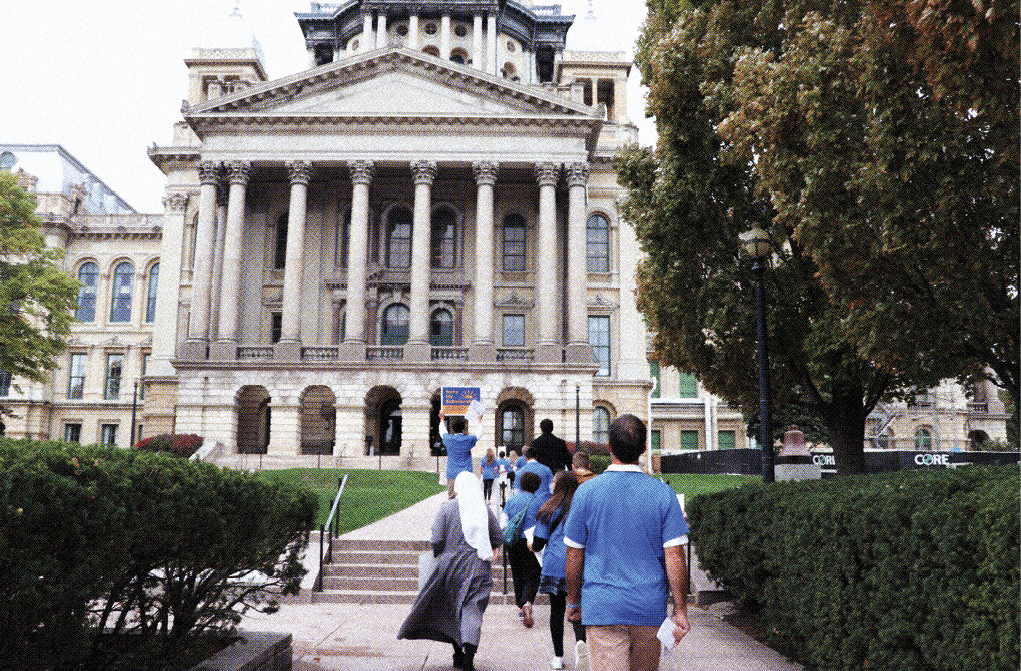
The fight also gave the public a good look at the self-serving dysfunction of teachers unions, and especially the Chicago Teachers Union. Teachers unions fund more than 80% of Illinois legislators. The Chicago Teachers Union gave money to 88 of them, including many whose districts have no overlap with Chicago Public Schools. In the final months as school choice advocates were trying to save the scholarship program, teachers unions spread $1.5 million in campaign cash to kill it. The union bosses even got a progressive Chicago radio station to kill pro-Invest in Kids ads after a deal had already been made to run them. No explanation was given, but then none was really needed: teachers unions couldn’t win on the merits of their position, so silencing school choice advocates was easier.
But the CTU’s dominance can’t last. The institute’s efforts to expose the real CTU seriously damaged the union’s reputation among Chicago voters. Those who viewed CTU favorably last year went from +17 in January to -9 in October.
State lawmakers failed disadvantaged students and the public in 2023. That will have consequences. The fight for school choice is far from over, and most Illinoisans are in favor of advancing it.
That’s a good place to be in 2024 as the fight for school choice returns.
Government unions lost support from the public – and their own members – in 2023

Labor unions may tout high approval ratings nationwide, but that’s not the case in Illinois. Government unions lost the public’s favor and saw declining membership numbers in 2023.
Nowhere was that more evident than with the Chicago Teachers Union, Illinois’ most powerful union. Under the leadership of its president, Stacy Davis Gates, the union saw its reputation sink in 2023, according to polling conducted by Illinois Policy Institute. It also saw a downturn in membership.
This is consistent with a larger trend: overall, government union membership is down. Over 36,000 workers have chosen not to associate with their government unions since 2017, the last full year of reporting before the U.S. Supreme Court ruled in Janus v. AFSCME that
government workers cannot be forced to fund the political agendas of union bosses.
The Illinois Policy Institute’s robust reporting on union corruption along with the institute’s offer of assistance to workers looking to opt out of their unions is paying off. Here are just some of the highlights from 2023.
Chicago Teachers Union lost both public and teacher support with Stacy Davis Gates at the helm
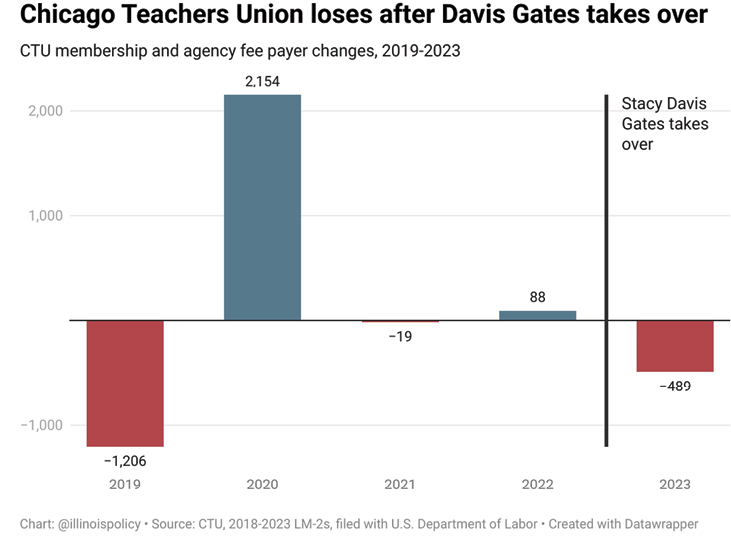
Absolute power corrupts absolutely, as Lord Acton wrote in 1887. That’s definitely playing out with CTU and its current president, Stacy Davis Gates. The union is the major political player in Chicago, even bankrolling Chicago Mayor Brandon Jonson’s run for office. But it was rocked by scandals in 2023.
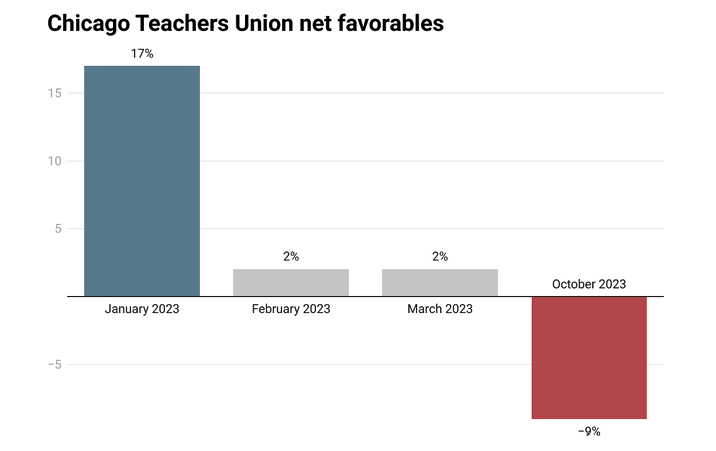
That corruption gave the Illinois Policy Institute plenty to investigate and report on in 2023. As a result, the union has suffered a significant downturn in public favor as well as a loss of membership.
In January, the Chicago Teachers Union enjoyed a +17 net favorable rating among Chicago voters, with 57% of voters having a favorable opinion versus just 40% with an unfavorable opinion, according to polling conducted for the institute.
By October, the union’s net favorable rating had plummeted 26 points to -9. Now, just 37% of Chicago voters have a favorable opinion of the union, compared to 46% with an unfavorable opinion.
In addition, nearly 500 education employees stopped affiliating with CTU in fiscal year 2023 compared to fiscal year 2022, as shown in the union’s report with the U.S. Department of Labor. And because the union’s federal filing covers July 1, 2022, through June 30, 2023, those numbers don’t account for any teachers who left the union in August 2023, the union’s annual opt-out “window.”
What brought the union to this point? A year rocked by scandals and the institute’s unrelenting investigations and reporting.
Davis Gates’ hypocrisy was exposed when it was revealed she had placed her own son in private school, while demanding an end to Illinois’ only school choice program. In defending her decision, she stated she and her husband made the choice “so [their son] could live out his dream of being a soccer player while also having a curriculum that can meet his social and emotional needs.” Her relentless advocacy against the
scholarship program effectively crushed the dreams of more than 9,600 low-income children who will lose the scholarships provided by the now defunct program.
But the institute’s reporting on Davis Gates’ hypocrisy made her a household name. According to Illinois Policy Institute polling, nearly half of Chicago voters are now aware Davis Gates has chosen to send one of her children to private school instead of his local public school.
The institute also broke the story Davis Gates was receiving an Indiana property tax deduction reserved for owners who actually occupy their homes. She should have been paying four times as much in property taxes. The county removed the deduction and is seeking back taxes and a penalty. She missed the Dec. 8 deadline for paying those back taxes. Shortly thereafter, the institute discovered Davis Gates owes the city of Chicago nearly $5,600 for utilities on her Illinois home. She makes at least $289,000 a year.
Aside from Davis Gates’ personal controversies, the union itself has been racked with malfeasance under her leadership. CTU did not have a good year in 2023. The union ran its first reported deficit, spent just 17 cents of each dollar representing members and spent three times more on politics than it did in any previous year reported.
As if that weren’t enough, the union has failed to provide required annual audits to members for at least three years, and raised its dues $160 for 2024 – most likely to compensate for its financial missteps. When the union bankrolled Brandon Johnson’s mayoral campaign without consulting its members, members started speaking out, and an unfair labor practice complaint was filed by members against their own union.
With CTU negotiating a new contract in 2024, the coming year promises more opportunities for the institute to expose the union for what it really is: a corrupt political player that puts the wishes of its leadership above what’s best for the people of Chicago and even its own members.
Other government unions reported large membership declines in 2023
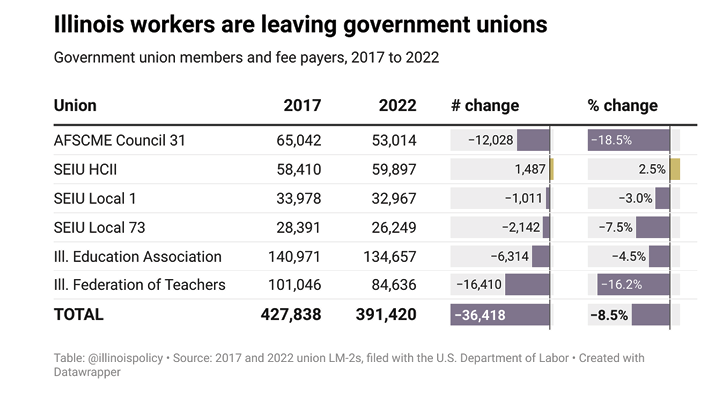
Five years ago, the U.S. Supreme Court ruled in Janus v. AFSCME that government workers cannot be forced to fund the political agendas of union bosses.
The institute has worked hard since then, informing workers how to opt out of their
government unions and assisting workers when unions place obstacles in their way.
Over 36,000 government workers have chosen not to associate with some of the largest and most politically active government unions in Illinois since 2017, the last full year of reporting before the Janus decision.
That loss in membership means approximately $36 million in dues did not flow into union coffers in 2023.
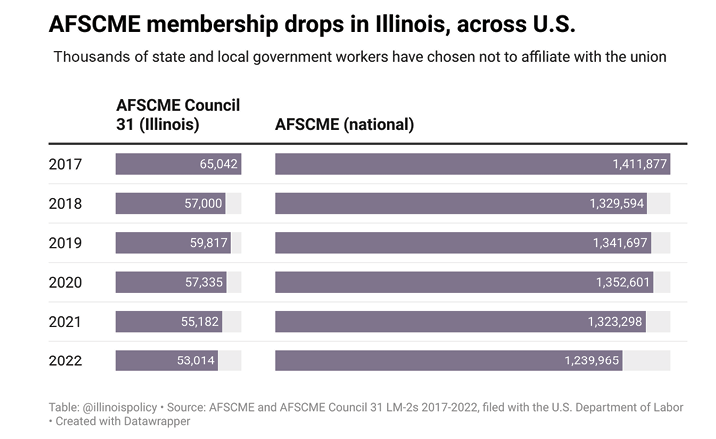
Among the unions hardest hit was the American Federation of State, County and Municipal Employees Council 31, which has seen more than 12,000 state and local government workers reject the union. That 18.5% drop is a strong indication AFSCME’s leadership is out of touch with what its members want – and that the institute’s efforts are working.
A close second is the Illinois Federation of Teachers, which is the state affiliate of CTU and other local teachers unions across the state. Nearly 16,500 education workers have rejected the union since 2017, representing a more than 16% drop.
But the number of workers rejecting union leadership is even higher than it looks in the unions’ federal reports.
Take the Service Employees International Union Healthcare Illinois-Indiana, or SEIU HCII, which appears to be the only major government union in Illinois that has gained members since 2017.
SEIU HCII reported just under 60,000 members and fee payers in its 2022 federal report, filed in March 2023. But on its website, it claims to represent “more than 91,000 workers” in four states.
That means at least one-third of workers represented by SEIU HCII have chosen not to be a part of the union.
Similarly, AFSCME Council 31 claims to represent 90,000 active and retired employees. But its federal report states it has just over 53,000 members and fee payers. That means over 40% of the employees it represents have rejected union membership.
Much remains to be done in Illinois, but the numbers are promising. Armed with the institute’s groundbreaking research, accurate reporting and assistance to employees wishing to get out of the behemoth government unions, both government workers and the general public are seeing the unions for what they really are: political machines that have only the union officials’ interests at heart.
Reining in Chicago Teachers Union’s maverick mayor, his pricey ideas
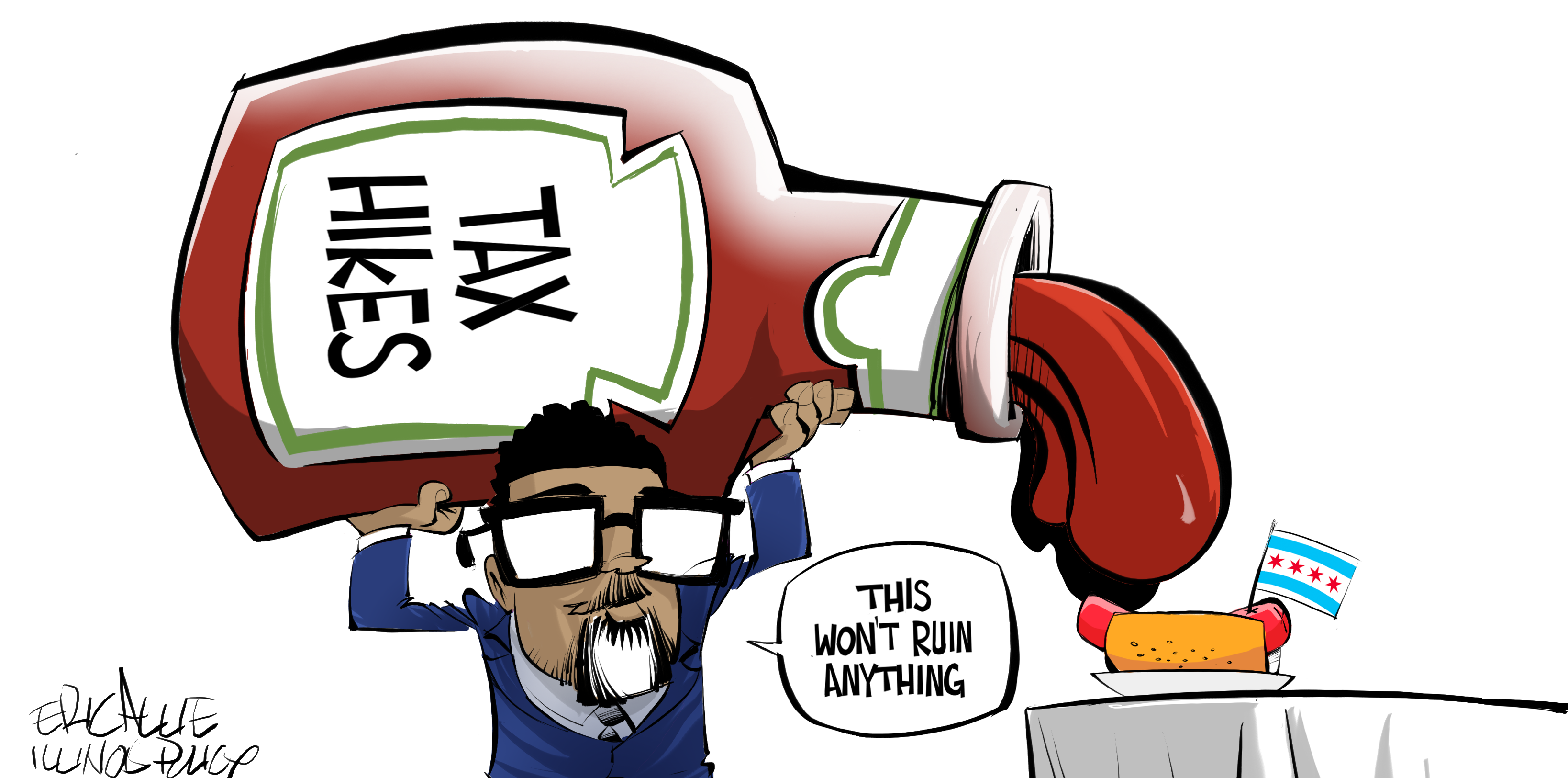
As a Chicago mayoral candidate, Brandon Johnson promised nearly $800 million in new taxes including:
- $98 million from “making the big airlines pay for polluting the air” in Chicago neighborhoods.
- $400 million from raising the real estate transfer tax on million-dollar properties.
- $100 million from new “user fees on high-end commercial districts frequented by the wealthy, suburbanites, tourists and business travelers.”
- Over $20 million from reinstating the $4-a-month-per-employee “head tax” on “large companies” that perform at least half their work in Chicago.
- $100 million from taxing financial transactions at a rate of $1 or $2 for every “securities trading contract.”
- $30 million from increasing Chicago’s already nation-leading hotel tax.
Constant pressure from the Illinois Policy Institute led to each of those items being left off Mayor Johnson’s first budget. He’s still pursuing the biggest one: raising the real estate transfer tax for million-dollar properties, but he needs to get it past voters March 19. The institute will let Chicagoans know the likely effects of the proposed tax on the city’s beleaguered business community.
What Johnson’s plan does to Chicago’s flat 0.75% real-estate transfer tax
- Lowers it to 0.60% for properties worth less than $1 million, a 20% reduction.
- Raises it to 2% for properties worth $1 million-$1.5 million, a 166% increase.
- Raises it to 3% if worth more than $1.5 million, a 300% increase.
The plan would harm commercial properties most as they make up the bulk of million-dollar real estate sales and already bear the second-highest commercial property taxes in the nation. Worse, it would hit mom-and pop stores as they are retiring and trying to sell what is likely their biggest asset.
Johnson’s mayoral opponent, Paul Vallas, joined the institute as a policy adviser. His expertise and the institute’s reach are serving as a check on the harms Johnson’s plan would inflict on businesses. Vallas now regularly publishes op-eds in the Chicago Tribune and articles on illinoispolicy.org, weighing in on issues such as Johnson’s real estate transfer tax plan.
This is the institute’s most immediate opportunity to show the ramifications of the mayor’s policy plans for the city’s residents and job-creators. We’ve already shown Chicagoans’ dissatisfaction with their mayor. Institute polling found only 28% of Chicago voters in October approved of Johnson’s job as mayor, one of the lowest mayoral approval ratings in more than 40 years.
The discontent with the mayor puts CTU in the spotlight as the two are inseparable. In summer 2024, CTU’s contract with the city expires and they will negotiate with a mayor they hand-picked for city hall. Just as the institute was the first to circulate how the CTU bankrolled Johnson’s campaign with millions, including member dues, we will again be the top watchdog when he returns the favor to his former employer. CTU President Stacy Davis Gates said there will be “some pretty strong demands” when it’s time to head to the bargaining table. Taxpayers will be on the hook for the price tag of a contract that will last until 2029.
Finances

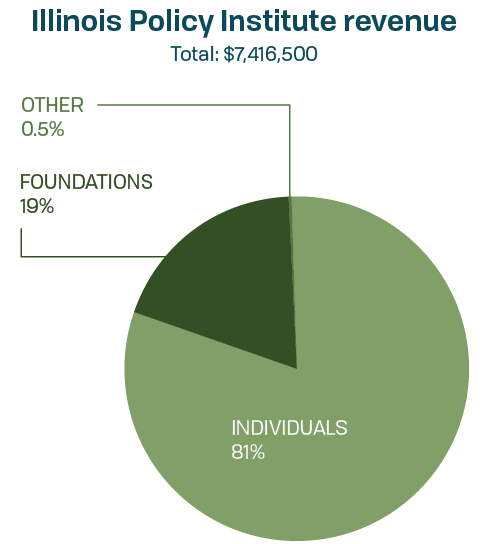
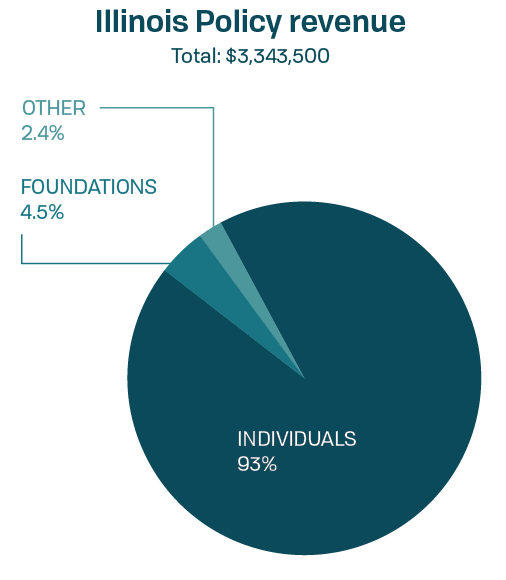
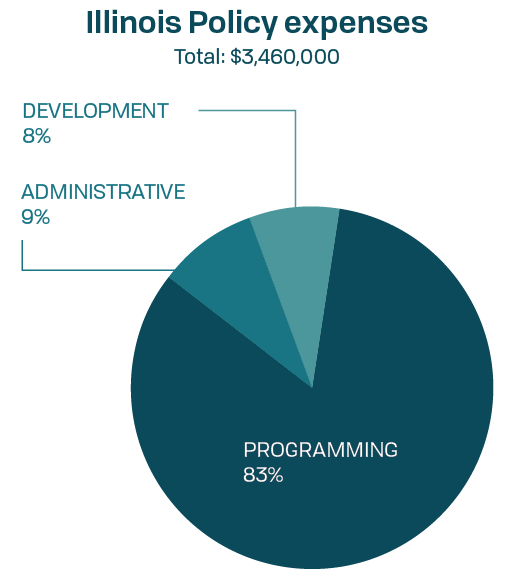
Who we are
The Illinois Policy Institute is the strongest voice for taxpayers in the state. We stand up for regular Illinoisans who deserve a voice in their government but have been ignored in favor of special interests for too long. We educate and engage Illinoisans from all walks of life to ensure our state is a place where everyone has the opportunity to thrive. Illinois is a place we should all be proud to call home.
The Illinois Policy Institute is a nonpartisan 501(c)(3) research organization. Our partner organization, Illinois Policy, is an independent, nonpartisan 501(c)(4) advocacy organization.
The Illinois Policy Institute
works for a state where:
- People of all talents, interests and cultural backgrounds can find dignity in work and succeed with hard work and ingenuity.
- Effective, efficient, honest and transparent government is accountable to taxpayers and residents in need – not special interests.
- Businesses grow, flourish and create more jobs and opportunities.
- Laws empower people – and limit the power of government.
- A good education is available and attainable for all students and families.
Our leaders
John Tillman
Chairman
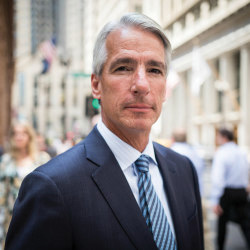
John Tillman is one of the nation’s most prominent leaders in the free-market, public-policy arena. He is CEO of the American Culture Project, an organization that attracts, educates and mobilizes independent voters around the ideas of freedom and opportunity.
John is best known for building the Illinois Policy Institute, which he currently chairs, into one of the most influential state-based think tanks in the country while he was CEO from 2007 to 2021. The institute was a key part of the coalition that defeated Gov. J.B. Pritzker’s progressive income tax in 2020.
While leading the institute, he co-founded and served as chairman of the Liberty Justice Center, which won the precedent-setting Janus v. AFSCME case before the U.S. Supreme Court in 2018.
John has founded and chairs numerous other enterprises within the liberty space. As chairman of the Franklin News Foundation beginning in 2017, he turned a near-insolvent operation into a media powerhouse that has news bureaus in every state and Washington, D.C. Their newswire service, The Center Square, is republished in hundreds of newspapers throughout the country and has a daily readership of 2.2 million.
John is also the co-founder and chairman of Iron Light, a full-service, for-profit digital marketing agency, which does work for more than 75 nonprofits across the conservative public policy space.
Matt Paprocki
President and CEO

Matt Paprocki is president and CEO of the Illinois Policy Institute. He lives in Chicago with his wife, Anna, and their daughter, Fiona, and son Rocky.
Matt earned a degree in business administration from the University of Notre Dame. He is an avid reader and runner and is a self-taught banjo player.
Matt is an appointed member of the U.S. Commission on Civil Rights Illinois Advisory Committee. He was previously appointed by then-Gov. Pat Quinn to serve on the Task Force on Charter School Funding. In addition to leading the Illinois Policy Institute, Matt is also the chairman of the Illinois Policy PAC, an advocacy group that gives taxpayers a stronger voice in Springfield. He has consulted for nonprofits around the country, advising leaders on how to grow, recruit talent and work strategically.
He started his career as a legislative staffer in Springfield, where he focused on budget and pension issues. Several decades later, these issues remain top of mind for Matt, who is committed to solving Illinois’ biggest policy crises. Matt is a proven leader whose work has helped the institute evolve into the leading state-based think tank in the country. He is deeply committed to making Illinois a place where anyone can achieve success and plant roots.
Amy Korte
Executive vice president

Amy Korte is the executive vice president of the Illinois Policy Institute. She lives in Chicago with her husband and three children. During her time at the institute, she has worked as an editor, led the policy team, and researched and written on topics such as property taxes, educational opportunity, and issues affecting jobs and growth in Illinois.
Prior to joining the institute, Amy worked for several years as a bankruptcy attorney at a major law firm in Chicago.
Amy earned her bachelor’s degree in government and French from the College of William and Mary and her law degree from Washington University School of Law.
Closing remarks
Our success is only possible with the support of partnering foundations, donors and 1818 Legacy Society members.
For the past 20 years, the Illinois Policy Institute has been the most dedicated, independent government watchdog for Illinois taxpayers. Looking ahead to the next 20 years and beyond, we intend to remain the state’s champion for freedom and a more prosperous free market so every Illinoisan can achieve the American Dream.
Our mission is to ensure the work you invest in today sows the seeds of liberty and prosperity for generations to come.
Giving to the Illinois Policy Institute is investing in the future of Illinois. Our work continues regardless of who is in office or what happens in Springfield. We are committed to stay and fight for limits on government and the expansion of liberty. We recognize this is no small endeavor, but with the support of our many partners we are in a position to lead the fight in Springfield and spread our work to cities throughout Illinois.
As Ronald Reagan said, “freedom is never more than one generation away from extinction.” Your trust in leaving a lasting legacy for freedom with the Illinois Policy Institute empowers us to not only vindicate the principles of our founders but to ensure the freedoms we have today exist decades from now.